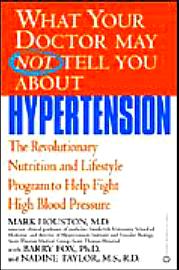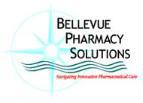Power Surge Live! Guest Chat
Thursday, Oct 23rd
9 PM (ET), 6 PM (PT)
Menopause, Midlife, Cardiovascular Disease
Hypertension -- The Silent Killer
MARK HOUSTON, M.D.

Author of
"What Your Doctor May Not Tell You About Hypertension:
The Revolutionary Nutrition and Lifestyle Program to Help Fight High Blood Pressure"
50 MILLION AMERICANS HAVE HYPERTENSION
36 MILLION OF THEM ARE TICKING TIME BOMBS!
• Vitamins, minerals, flavonoids, and other food-related
substances that can help reverse hypertension naturally
• The amazing healing powers of supplements such as omega-3 fatty acids,
olive oil, garlic, L-arginine, guava fruit, and more
• How to implement the DASH (Dietary Approaches to Stop Hypertension)
diet, plus delicious, healthy recipes
• Exercise and stress-reduction techniques and other lifestyle habits
that can help reduce high blood pressure.
One in four Americans suffers from high blood pressure, a deadly disease with
no early symptoms or warning signs. More than two-thirds of hypertension sufferers
do not have the disease under control, which means they have an increased
risk of stroke, heart attack, diabetes, and kidney failure. Now a pioneering researcher
and expert takes the treatment of hypertension into the twenty-first century with a
scientifically researched, highly effective, and drug-free program based on
his own successful, all-natural formula
Mark Houston, M.D.
author of "What Your Doctor May Not Tell You About Hypertension"
specializes in hypertension, lipid disorders, prevention and
treatment of cardiovascular diseases, nutrition, clinical age management
and general internal medicine with an active clinical and research practice
as well as teaching responsibilities for Vanderbilt medical students,
interns and residents. Dr. Houston has presented over 6,000 lectures on
hypertension nationally and internationally and has published over 120
articles in peer reviewed medical journals as well as textbook chapters,
handbooks, abstracts and films and completed over 50 clinical research
studies in hypertension, hyperlipidemia and cardiovascular disease.
AT THE END OF THE CHAT
FIVE LUCKY PEOPLE WILL WIN
FREE COPIES OF
"WHAT YOUR DOCTOR MAY NOT
TELL YOU ABOUT HYPERTENSION"
Meet and talk with
Mark Houston, M.D.
Thursday,
Oct. 23rd
at 9 PM (ET)
in Power Surge Live!
.
*** *** *** *** *** *** *** *** *** ***
What Is Hypertension?
*** *** *** *** *** *** *** *** *** ***
When you have high blood pressure, or hypertension, the force of blood
against your artery walls is too strong. High blood pressure can damage
your arteries, heart, and kidneys, and lead to atherosclerosis and stroke.
Hypertension is called a "silent killer'' because it does not cause
symptoms unless it is severely high and, without your knowing it, causes
major organ damage if not treated.
Your blood pressure measurement consists of two numbers: systolic and
diastolic.
The systolic measurement is the pressure of blood against your artery walls
when the heart has just finished pumping (contracting). It is the first or
top number of a blood pressure reading.
The diastolic measurement is the pressure of blood against your artery
walls between heartbeats, when the heart is relaxed and filling with blood.
It is the second or bottom number in a blood pressure reading.
Level
Systolic Diastolic
High blood pressure is: 140 or above 90 or above
Prehypertension is: 120 to 139 80 to 89
Normal adult (age 18 or older)
blood pressure is: 119 or below 79 or below
Millions of people whose blood pressure was previously considered
borderline high (130–139/85–89 mm Hg) or normal (120/80) now fall into the "prehypertension" range, based on new, more aggressive high blood pressure
guidelines from the Seventh Report of the Joint National Committee (JNC 7)
on Prevention, Detection, Evaluation, and Treatment of High Blood Pressure
Because new studies show the risk of heart disease and stroke begins to
increase earlier than previously believed, health experts lowered the
acceptable normal range to promote more aggressive and earlier treatment of
high blood pressure
What causes high blood pressure?
In most cases, a doctor may not be able to pinpoint the exact cause of your
high blood pressure. But several factors are known to increase blood
pressure, including obesity, heavy alcohol use, family history of high
blood pressure, high salt intake, and aging. A sedentary lifestyle, stress,
low potassium intake, low calcium intake, and resistance to insulin may
also cause your blood pressure to rise. If one or more of these factors is
causing your high blood pressure, you have primary, or essential, high
blood pressure, which is the most common type.
Secondary high blood pressure is caused by certain medications or other
conditions, such as pregnancy or narrowing of the kidney arteries.
Labile hypertension is blood pressure that changes rapidly, often in
response to stress or activity. This type of high blood pressure is most
common in younger people.
Elevated blood pressure readings may not always mean you have high blood
pressure. For some people, just being in a medical setting causes their
blood pressure to rise. This is called white-coat hypertension.
Malignant hypertension (hypertensive crisis) is high blood pressure that
increases rapidly. The cause may be unknown or may be due to medication or
another condition.
Isolated systolic high blood pressure is when systolic blood pressure is
elevated above 140 mm Hg, but diastolic blood pressure stays at less than
90 mm Hg. This type of high blood pressure is more common in older adults,
especially older women. If you are over 50, a systolic blood pressure over
140 is a more important risk factor for heart disease and stroke than your
diastolic blood pressure. Are there risk factors that make it more likely I
will develop high blood pressure?
Several factors increase your risk for developing high blood pressure. Some
of them, such as salt intake and alcohol consumption, are lifestyle issues
that you can control. Other factors, such as your family history, are not
controllable.
Risk factors for primary (essential) high blood pressure include:
A family history of high blood pressure. Aging. Ninety percent of people
who, at age 55, do not have hypertension will eventually develop it Black
race. Sodium (salt) intake. Excessive alcohol consumption. Low intake of
potassium, magnesium, and calcium. Obesity.
How will I know if I have high blood pressure?
Usually you will not feel any warning signs or symptoms of high blood
pressure, and you will not know you have it until a health professional
takes a blood pressure reading. Hypertension develops slowly and can cause
serious organ damage, usually without any symptoms.
If you develop very severe high blood pressure, you may have headaches,
visual disturbances, nausea, and vomiting. Malignant high blood pressure
(hypertensive crisis), which is hypertension that rises rapidly, can also
cause these symptoms. Untreated malignant hypertension can damage the
brain, heart, eyes, or kidneys. It is a medical emergency that requires
immediate hospitalization.
Over time, if you do not receive treatment for your high blood pressure,
you may feel symptoms caused by damage to your heart, kidney, or eyes,
including:
Coronary artery disease, heart attack, heart failure, or abnormal heart
beat. Kidney (renal failure). Peripheral vascular disease. Retinopathy, or
damage to the tiny blood vessels that supply blood to the light-sensitive
lining of the back of the eye (retina). Stroke.
How will a health professional diagnose my high blood pressure?
You will be diagnosed with hypertension if your blood pressure measurements
are high (above 140/90 mm Hg) on three or more separate occasions. They are
usually measured 1 to 2 weeks apart. Except in very severe cases, the
diagnosis is not based on a single measurement.
If a health professional suspects you have hypertension, he or she will
conduct a physical exam and medical history. If there is reason to suspect
that the blood pressure measurements taken in the doctor's office do not
represent your accurate blood pressure (if, for example, you have white-
coat hypertension), measuring blood pressure away from the doctor's office
may be needed. Your blood pressure can rise more than 20 mm Hg systolic and
10 mm Hg diastolic from white-coat hypertension. Even routine activities,
such as attending a meeting, can raise your blood pressure by that amount.
Other factors that can raise your blood pressure include commuting to work,
exposure to cold, and drinking large amounts of alcohol.
In some cases, you may be asked to check your blood pressure at home 3
times a day and keep a record of the readings. If you are not able to
measure your blood pressure accurately at home, you may need to wear an
automated blood pressure cuff that periodically inflates and takes blood
pressure measurements during the day. This is called ambulatory blood
pressure monitoring.
High blood pressure screening tests and programs vary widely in
reliability. Results from automated blood pressure testing, such as you
might do at a grocery store or pharmacy, may not be accurate. Any high
blood pressure measurement discovered during a blood pressure screening
program needs to be confirmed by a health professional.
How can I lower my high blood pressure?
If you fall into the prehypertension range (120–139/80–89 mm Hg), your
doctor will likely recommend lifestyle modifications, including losing
excess weight, exercising, limiting alcohol, cutting back on salt, quitting
smoking, and following the Dietary Approaches to Stop Hypertension (DASH)
diet. The DASH eating plan is a low-fat and low-saturated-fat diet that
emphasizes eating more fruits, vegetables, whole grains, and low-fat dairy
foods.
If you have high blood pressure (140–159/90–99 mm Hg) and you do not have
any organ damage or other risk factors for heart disease (uncomplicated
high blood pressure), your doctor will likely recommend lifestyle changes
and possibly medications. Most people with high blood pressure will need
two or more medications, including a thiazide-type diuretic, to lower their
blood pressure to below 140/90 mm Hg, the goal for people with
uncomplicated hypertension. If you have other conditions, such as diabetes,
heart failure, or chronic kidney disease, your goal blood pressure is
lower: 130/80 mm Hg.
If your blood pressure is 160–179/100–109 mm Hg or higher, you and your
doctor may need to try various combinations of medications to find what
works best for you. You will also need to make aggressive lifestyle
changes.
Overall, your treatment will depend upon how high your blood pressure is,
whether you have other medical conditions, such as diabetes, and whether
any organs have already been damaged. Your risk of developing other
diseases, especially heart disease, will be another important factor your
doctor will consider.
Strategies for treating high blood pressure in pregnant women are quite
different. See the topic Preeclampsia and Hypertension During Pregnancy for
more information.
Who can treat my high blood pressure?
Although you may have your blood pressure checked outside of a doctor's
office, you must see a health professional to confirm that you have high
blood pressure, so that you and your doctor can develop a treatment plan
that's right for you. A family practice doctor, internist, nurse
practitioner, or physician's assistant can diagnose and treat your high
blood pressure. If you have extremely high blood pressure or heart
problems, you may also need to see a heart specialist (cardiologist).
What lifestyle changes will I have to make to lower my high blood pressure?
If you have primary (essential) hypertension, you will first need to look
closely at the foods you eat. Your health professional may recommend that
you follow the DASH diet. Losing weight if you need to and exercising will
also be important for lowering your blood pressure.
If you smoke cigarettes, you will need to quit. If you are a heavy drinker,
you will need to severely cut back on your consumption of alcohol. Also, it
may be necessary for you to learn to check your blood pressure at home.
Will I need to take medications for the rest of my life?
High blood pressure treatment, whether it involves medication or lifestyle
changes, usually is a lifelong process.
Whether you need medication depends on the severity of your high blood
pressure and whether you have other health problems or conditions, such as heart failure or diabetes, or are pregnant.
If your doctor prescribes medication, it is extremely important to take
your medications as prescribed.
The high blood pressure stages described in this topic were defined in 2003
by the Joint National Committee on Prevention, Detection, Evaluation, and
Treatment of High Blood Pressure (JNC 7), a United States group of high
blood pressure experts
In addition to lifestyle changes, several other nondrug methods of
reducing blood pressure can be tried.
Theses methods generally are considered to be safe and may have other benefits
besides lowering blood pressure. Although there may be an association between
a particular stressful situation and high blood pressure, this does not prove
that altering the situation will affect blood pressure. Since it is simple to
check your blood pressure, you can easily monitor the effects of these methods
on lowering your blood pressure.
Other Treatment Choices
Potassium, calcium, and magnesium supplements Fiber supplements Alternative
or complementary medicine therapies that help reduce stress and improve
quality of life may have some effect on blood pressure. These therapies
include:
Stress management
Guided imagery
Yoga
Meditation
Biofeedback
Hypnosis
Acupuncture
Although eating garlic and onions has been recommended to reduce
blood pressure, evidence shows that only very small decreases in
blood pressure may result. Fish oil (omega-3 fatty acids) also may
have some effect on lowering blood pressure.
********
Share Support, Information And Friendship On
The New, Updated Web Site's Message Boards
/php/forums/index.php
********
Hundreds of Experts In The Area Of Women's Health
Have Visited Power Surge . . .
Many More Are Coming!
See the Power Surge Guest Schedule
*****
Check out the
informative articles in
Educate Your Body
Dozens of menopause-related subjects
********
Have questions?
Ask Power Surge's Experts
********
Ten Years of Helpful Menopause Treatments
Power Surge Recommendations
*** *** *** *** *** *** *** *** *** ***
SAFE AND EFFECTIVE SOY PROTEIN
AND ISOFLAVONES FOR TREATING MENOPAUSE
*** *** *** *** *** *** *** *** *** ***
The one thing that eliminated my hot flashes, depression,
fatigue, vaginal dryness, mood swings, lowered my
menopause-related cholesterol by over 100 points and
generally gave me back my life the past 5 1/2 years has
been doctor-formulated Revival Soy Protein. I've seen Revival
help not only me, but thousands of other women experiencing the
typical symptoms of perimenopause. Soy is SAFE and has been
used as a staple in the diet of Japanese women for thousands of
years. They are considered among the healthiest women in the
world. Soy is effective and reliable, especially for those who can't
or choose not to use hormone replacement therapy. The FDA
approves the use of SOY in lowering cholesterol and providing
general heart health. It's made from non-genetically engineered
soybeans. Most of the soy products on the market are genetically
modified. Revival is made from the isoflavones are taken from the
heart" of the soybean where isoflavones are most concentrated.
Read more about my personal story
Ask Medical Director, Aaron Tabor, M.D. anything at
Ask The Soy Doctor
Read Dr. Tabor's last transcript
********
Soy Isoflavones (Revival Soy), vitamins, herbs, creams,
naturally compounded "bio-identical" hormones
(molecularly identical to those your body produces)
compounded by Power Surge Pharmaceutical Consultant
of 8 years, Pete Hueseman, R.Ph., P.D.
and The Women's Active Multi Vitamin
contains every vita-nutrient a midlife woman needs
|








